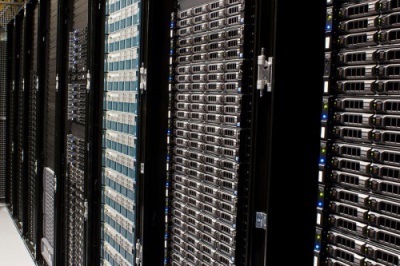
Server Racks Image from Wikimedia Commons
A server is a computer in a client/server network that provides services or "roles" on a network and provides a central location for administration of the network. In order to perform these roles, the computer has special server operating system software.
The role a server might play on the network is file server, print server, application server, mail server, and many more. A server might perform a single role, or it might perform multiple roles simultaneously.
One of the most common roles a server performs is file server. A file server provides a pool of disc space allowing an organization to maintain a single copy files, rather than multiple copies on different work stations. This has the advantage of the requirement to backup only a single computer.
Another common role performed by a server is print server. A print server allows workstations to share a single printer on the network, removing the need for each workstation to have its own printer.
When a server acts as an application server it allows an application used by multiple workstations to be run on the server. This has the advantage of requiring only one instance of the application to be patched and updated.
As a mail server, the server stores and transfers email between different computers on the network.
Some of the most important roles performed by a server is domain controller, Domain Name System (DNS) server, and Dynamic Host Configuration Protocol (DHCP) server. A domain is a network or subnetwork where the group of clients and servers on the network or subnetwork use a central security database stored on a centralized server known as a domain controller to authenticate users. This simplifies user logon servers and services and allows centralized administration.
The DNS service resolves domain names to IP addresses. If resources on the network are to made available on the Internet, you would need a server configured a DNS server.
DHCP automatically assigns IP addresses on client computers. With DHCP a device can have a different IP address every time it connects to the network. In most configurations, a devices IP address will expire after a pre-configured interval and the device's IP address will change while it is still connected.
Another role performed by a server is Web server. A Web server runs Web server software which allows the creation of websites, and uses HTTP protocol to respond to requests from a user's browser by sending back Web pages and uses FTP to allow file downloads and uploads.
Administration of a server involves keeping the antivirus software up to date, performing a routine regimen, and installing software updates and patches.
More Networking Basics:
• Basics of Bluetooth Technology
• Cloud Service Models
• Web Server
• What Routers Do
• Network Servers
• What is DNS?
• Networking Foundation Topic - Routing
• Virtualization For Dummies Cheat Sheet
• What is DSL and how can it benefit my home or small business?
• Cloud Delivery Models

